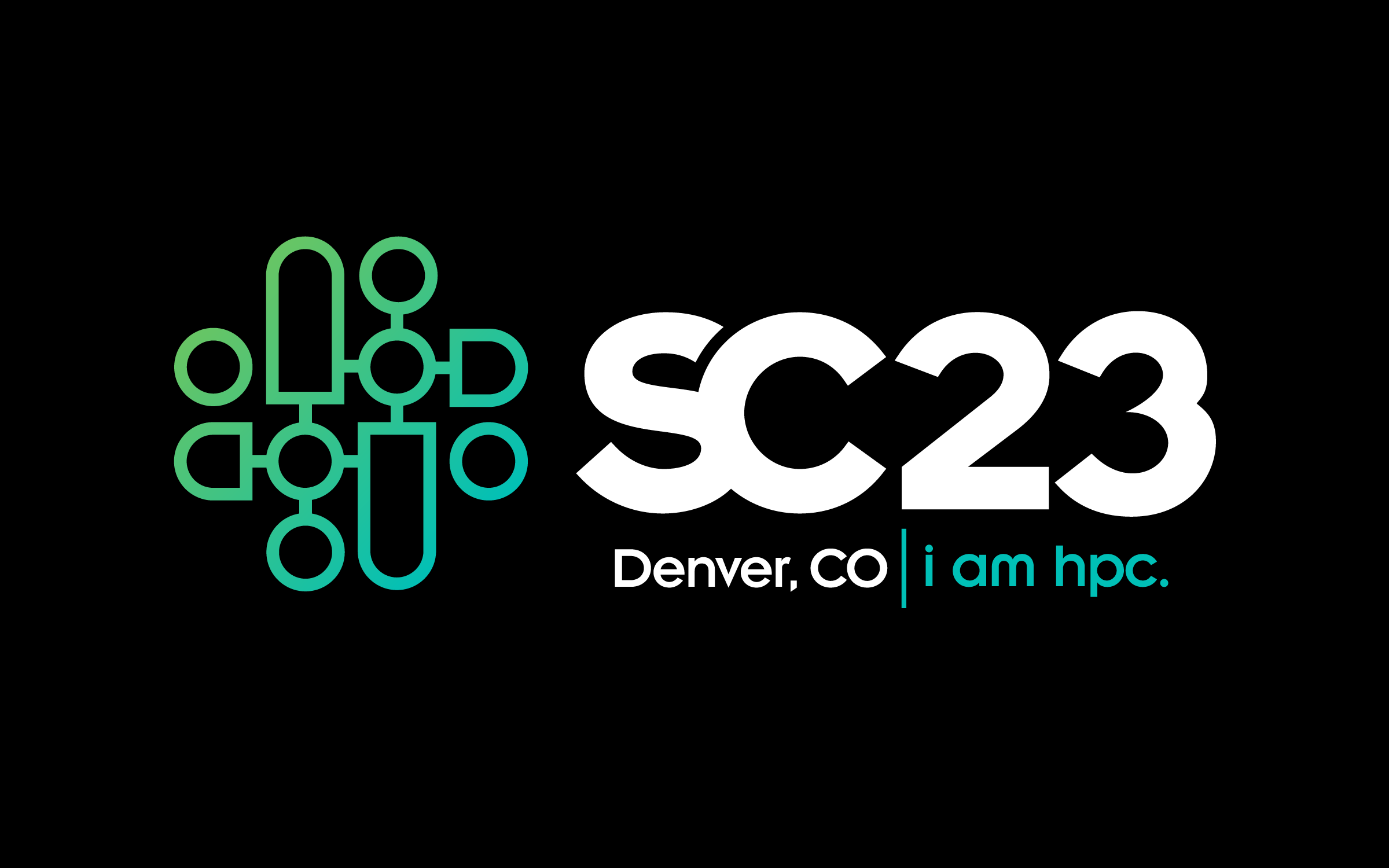Welcome to the PAW-ATM Workshop.
- Proceedings
- Program
- Important dates
- Summary
- Scope and Aims
- Topics
- Submissions
- Organization
- Previous Instances of PAW-ATM
Program
- 9:00 - 9:02 Karla V. Morris Wright, Elliott Slaughter, Engin Kayraklioglu, Irene Moulitsas, Bill Long, and Daniele Lezzi
PAW-ATM2023 Introduction
(Presentation)
- 9:02 - 10:00 Survey of Technologies for Developers of Parallel Applications
Open discussion after presentations on SHMEM, Julia, Swift/T, and cuNumeric
Session Chair: Elliott Slaughter - SLAC National Accelerator Laboratory
Barbara Chapman - Hewlett Packard Enterprise (Presentation)
Justin Wozniak - Argonne National Laboratory (Presentation)
Johannes Blaschke - Lawrence Berkeley National Laboratory (Presentation)
Rohan Yadav - NVIDIA (Presentation)
- 10:00 - 10:30 Morning Break (30 min)
- 10:30 - 12:30 Session 1 Session Chair: Henry Monge Camacho - Oak Ridge National Laboratory
- 10:30 - 10:54 Tom Westerhout and Bradford L. Chamberlain
Implementing Scalable Matrix-Vector Products for the Exact Diagonalization Methods in Quantum Many-Body Physics
(Presentation,
Abstract)
- 10:54 - 11:18 Scott Bachman, Rebecca Green, Anna Bakker, Helen Fox, Sam Purkis, and Ben Harshbarger
High-Performance Programming and Execution of a Coral Biodiversity Mapping Algorithm Using Chapel
(Presentation,
Abstract)
- 11:18 - 11:42 Jiakun Yan, Hartmut Kaiser, and Marc Snir
Design and Analysis of the Network Software Stack of an Asynchronous Many-Task System -- The LCI Parcelport of HPX
(Presentation,
Abstract)
- 11:42 - 12:06 Marcin Rogowski, Jeff R. Hammond, David E. Keyes, and Lisandro Dalcin
shmem4py: High-Performance One-Sided Communication for Python Applications
(Presentation,
Abstract)
- 12:06 - 12:30 James Psota, and Armando Solar-Lezama
Pure: Evolving Message Passing to Better Leverage Shared Memory Within Nodes
(Presentation,
Extended Abstract,
Abstract)
- 12:30 - 2:00 Lunch Break (90 min)
- 2:00 - 3:00 Session 2 Session Chair: Damian Rouson - Lawrence Berkeley National Laboratory
- 3:00 - 3:30 Afternoon Break (30 min)
- 3:30 - 3:54 Session 3 Session Chair: Engin Kayraklioglu - Hewlett Packard Enterprise
- 3:54 - 5:30 Panel Discussion: Charting a Path to Success with Alternatives to MPI+X Panel Chair: Michelle Strout - Hewlett Packard Enterprise
- Ewa Deelman - University of Southern California
- Jonathan Graham - Los Alamos National Laboratory
- Ethan Gutmann - National Center for Atmospheric Research
- Laxmikant Kale - University of Illinois Urbana-Champaign
- George Karypis - University of Minnesota
-
Distinguished Speaker: Ethan Gutmann - National Center for Atmospheric Research
Trials, Tribulations and Joys of Developing with Alternative Parallel Frameworks
(Presentation, Abstract)
- Julian Bellavita, Mathias Jacquelin, Esmond Ng, Dan Bonachea, Johnny Corbino, and Paul H Hargrove
symPACK: A GPU-Capable Fan-Out Sparse Cholesky Solver
(Presentation, Abstract)
Panelists:
Important dates
- Submissions deadline:
July 24, 2023July 31, 2023 - Manuscripts review period: August 2-23, 2023
- Upload manuscripts reviews to Linklings: August 23, 2023
- Building consensus: August 24 - August 29, 2023
- Notification to authors: August 31, 2023
- Updated AD/AE appendix due from authors: September 4, 2023
- AD/AE review period: September 5-24, 2023
- Final AD/AE decisions: September 25, 2023
- Final program: September 25, 2023
- Camera-ready papers due from authors: September 27, 2023
- Virtual participants upload video presentations: September 29, 2023
- PAW-ATM workshop date: November 13, 2023
Summary
As supercomputers become more and more powerful, the number and diversity of applications that can be tackled with these machines grows. Unfortunately, the architectural complexity of these supercomputers grows as well, with heterogeneous processors, multiple levels of memory hierarchy, and many ways to move data and synchronize between processors. The MPI+X programming model, use of which is considered by many to be standard practice, demands that a programmer be expert in both the application domain and the low-level details of the architecture(s) on which that application will be deployed, and the availability of such superhuman programmers is a critical bottleneck. Things become more complicated when evolution and change in the underlying architecture translates into significant re-engineering of the MPI+X code to maintain performance.
Numerous alternatives to the MPI+X model exist, and by raising the level of abstraction on the application domain and/or the target architecture, they offer the ability for “mere mortal” programmers to take advantage of the supercomputing resources that are available to advance science and tackle urgent real-world problems. However, compared to the MPI+X approach, these alternatives generally lack two things. First, they aren’t as well known as MPI+X and a domain scientist may simply not be aware of models that are a good fit to their domain. Second, they are less mature than MPI+X and likely have more functionality or performance “potholes” that need only be identified to be addressed.
PAW-ATM is a forum for discussing HPC applications written in alternatives to MPI+X. Its goal is to bring together application experts and proponents of high-level languages to present concrete example uses of such alternatives, describing their benefits and challenges.
Scope and Aims
The PAW-ATM workshop is designed to be a forum for discussion of supercomputing-scale parallel applications and their implementation in programming models outside of the dominant MPI+X paradigm. Papers and talks will explore the benefits (or perhaps drawbacks) of implementing specific applications with alternatives to MPI+X, whether those benefits are in performance, scalability, productivity, or some other metric important to that application domain. Presenters are encouraged to generalize the experience with their application to other domains in science and engineering and to bring up specific areas of improvement for the model(s) used in the implementation.
In doing so, our hope is to create a setting in which application authors, language designers, and architects can present and discuss the state of the art in alternative scalable programming models, while also wrestling with how to increase their effectiveness and adoption. Beyond well-established HPC scientific simulations, we also encourage submissions exploring artificial intelligence, big data analytics, machine learning, and other emerging application areas.
Topics
Topics of interest include, but are not limited to:
- Novel application development using high-level parallel programming languages and frameworks.
- Examples that demonstrate performance, compiler optimization, error checking, and reduced software complexity.
- Applications from artificial intelligence, data analytics, bioinformatics, and other novel areas.
- Performance evaluation of applications developed using alternatives to MPI+X and comparisons to standard programming models.
- Novel algorithms enabled by high-level parallel abstractions.
- Experience with the use of new compilers and runtime environments.
- Libraries using or supporting alternatives to MPI+X.
- Benefits of hardware abstraction and data locality on algorithm implementation.
Papers that include description of applications that demonstrate the use of alternative programming models will be given higher priority.
Submissions
Submissions are solicited in 2 categories:
Full-length papers will be published in the workshop proceedings. Submitted papers must describe original work that has not appeared in, nor is under consideration for, another conference or journal. Papers shall be eight (8) pages minimum and not exceed ten (10) pages including text, appendices, and figures, but excluding bibliography and acknowledgments. Submissions shall not exceed twelve (12) pages total under any circumstance.
Extended abstracts will be evaluated separately and will not be included in the published proceedings; they are intended to propose timely communications of novel work that will be formally submitted elsewhere at a later stage, and/or of already published work that would be of interest to the PAW-ATM audience in terms of topic and timeliness. Extended abstracts shall not exceed four (4) pages.
When deciding between manuscript submissions with similar merit, submissions whose focus relates more directly to the key themes of the workshop (application studies, computing at scale, high-level alternatives to MPI+X) will be given priority over those that don't.
Manuscripts shall be submitted through Linklings. Please use the ACM Primary Article Template guide and proceedings template with option sigconf.PAW-ATM follows the reproducibility initiative of SC23. Submissions shall include an Artifact Description (AD) appendix. The appendix pages related to the reproducibility initiative dependencies are not included in the page count.
Please include a draft of your AD/AE appendix with the initial manuscript pdf submission. Authors will have the opportunity to revise the appendix before its final submission on September 4, 2023.
Organization
Workshop Chair
- Karla Vanessa Morris Wright - Sandia National Laboratories
Organizing Committee
- Engin Kayraklioglu - Hewlett Packard Enterprise
- Irene Moulitsas - Cranfield University
- Elliott Slaughter - SLAC National Accelerator Laboratory
Program Committee Chairs
- Bill Long - Hewlett Packard Enterprise
- Daniele Lezzi - Barcelona Supercomputing Center
Program Committee
- Dan Bonachea - Lawrence Berkeley National Laboratory
- Jan Ciesko - Sandia National Laboratories
- Iacopo Colonnelli - University of Turin
- Mario Di Renzo - University of Salento and Stanford University
- Salvatore Filippone - Università di Roma Tor Vergata
- Magne Haveraaen - University of Bergen
- Peter Hawkins - Google
- Engin Kayraklioglu - Hewlett Packard Enterprise
- Jannis Klikenberg - RWTH Aachen University
- Daniele Lezzi - Barcelona Supercomputing Center
- Bill Long - Hewlett Packard Enterprise
- Francesc Lordan - Barcelona Supercomputing Center
- Lee Margetts - University of Manchester
- Fabrizio Marozzo - University of Calabria
- Josh Milthorpe - Australian National University
- Henry Monge Camacho - Oak Ridge National Laboratory
- Karla Vanessa Morris Wright - Sandia National Laboratories
- Irene Moulitsas - Cranfield University
- Elliott Slaughter - SLAC National Accelerator Laboratory
- Kenjiro Taura - University of Tokyo
- Miwako Tsuji - RIKEN Advanced Institute for Computational Science
Artifact Evaluation Committee Chair
- Irene Moulitsas - Cranfield University
Artifact Evaluation Committee Members
- Scott Baden - University of California San Diego
- Desmond Bisandu - Cranfield University
- Valentin Churavy - Massachusetts Institute of Technology
- Fabio Durastante - University of Pisa
- Yakup Koray Budanaz - Technical University of Munich
- Boyu Kuang - Cranfield University
- Soren Rasmussen - National Center for Atmospheric Research
- Anjiang Wei - Stanford University
Advisory Committee
- Bradford L. Chamberlain - Hewlett Packard Enterprise
- Damian W. I. Rouson - Lawrence Berkeley National Laboratory
- Katherine A. Yelick - Lawrence Berkeley National Laboratory
Previous Instances of PAW-ATM
- PAW-ATM2023: Parallel Applications Workshop, Alternatives To MPI+X
- PAW-ATM2022: Parallel Applications Workshop, Alternatives To MPI+X
- PAW-ATM2021: Parallel Applications Workshop, Alternatives To MPI+X
- PAW-ATM2020: Parallel Applications Workshop, Alternatives To MPI+X
- PAW-ATM2019: Parallel Applications Workshop, Alternatives To MPI+X
- PAW-ATM2018: Parallel Applications Workshop, Alternatives To MPI
- PAW2017: PGAS Applications Workshop
- PAW2016: PGAS Applications Workshop

